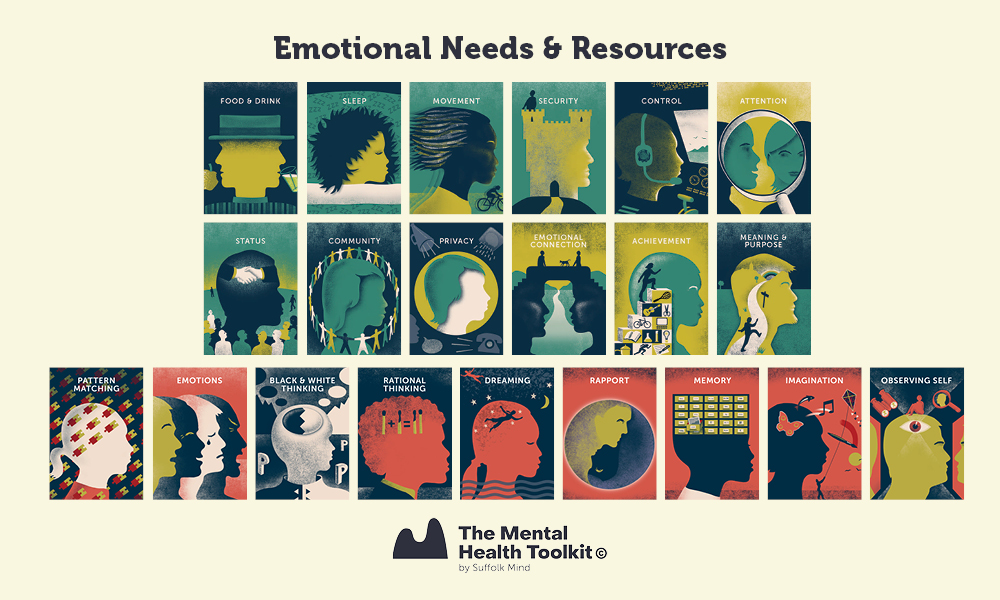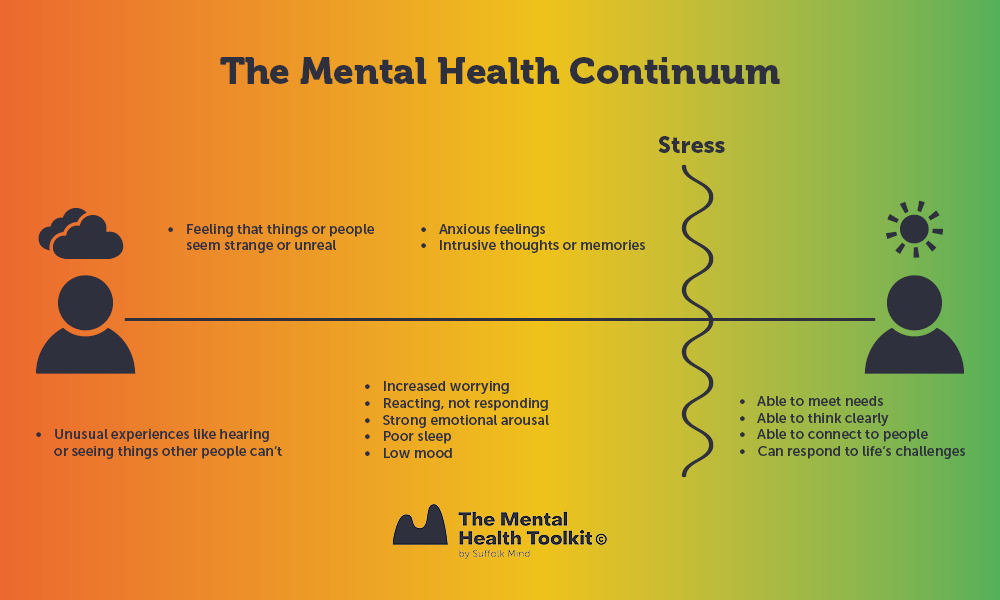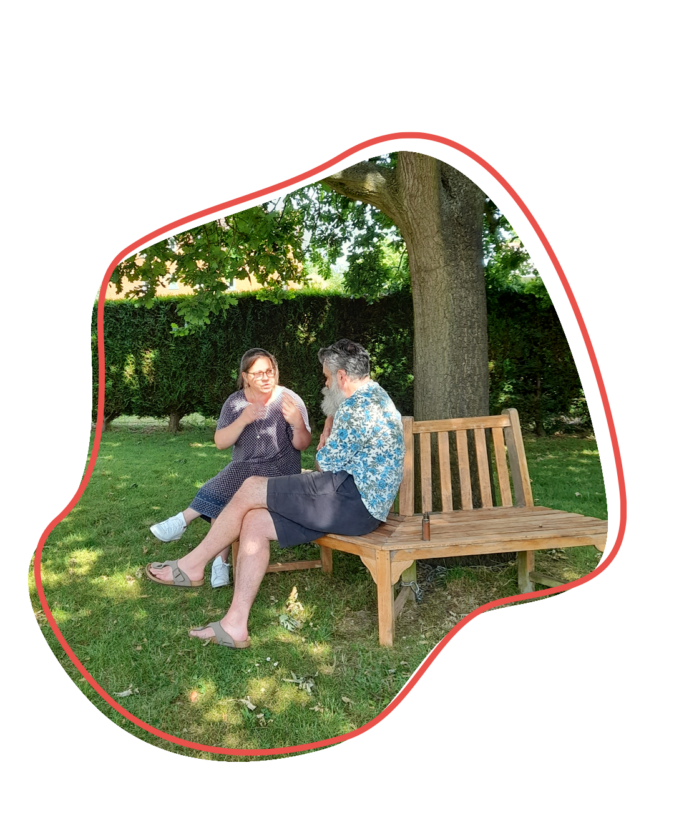Find out more about The Mental Health Toolkit approach

Meeting our Emotional Needs is at the core of everything The Mental Health Toolkit stands for
As you Explore the Toolkit and the mental health training we offer, you may come across some terms and phrases that are unfamiliar to you.
On this page, we take you through our approach, and introduce you to the Emotional Needs & Resources, the Mental Health Continuum, the Human Function Curve and the RIGAAR framework.
The Emotional Needs & Resources approach

Suffolk Mind, our parent organisation, use an ‘organising idea’ to help you stay well. This idea is that we all have physical and emotional needs and a set of skills and resources that we’re born with to meet those needs. We call this the Emotional Needs & Resources approach.
We have 12 physical and emotional needs and 9 resources. These are:
Physical and Emotional Needs
- Sleep
- Movement
- Food & Drink
- Security
- Control
- Attention
- Status
- Community
- Privacy
- Emotional Connection
- Achievement
- Meaning & Purpose
Resources
- Pattern Matching
- Emotions
- Black & White Thinking
- Rational Thinking
- Dreaming
- Rapport
- Memory
- Imagination
- Observing Self
This approach forms the basis of all of our training courses and sessions at The Mental Health Toolkit.
If you would like to learn more, why not book an Introduction to The Mental Health Toolkit session? This taster workshop goes into a little more detail about our Emotional Needs & Resources, and is suitable for starting discussions around wellbeing in larger groups.
Ready to go more in-depth? The Essentials is a half-day course which takes you through the Emotional Needs & Resources in detail, and helps equip you and your team with the skills to meet your needs, and utilise your resources, to help you stay mentally well.
You can also take part in the Emotional Needs Audit – our anonymous survey which gives you a moment to check in with yourself, and assesses how well you’re meeting your needs right now.
If you have any queries, or want to learn more about Emotional Needs & Resources through our training packages, please contact our team.

Human Function Curve
The Human Function Curve helps us identify if we are stressed or stretched.
When we are stretched, we may be facing challenges, but we feel confident that we can deal with them. This could include leading a big project at work, or going through a company restructure. Stretch helps us meet many of our needs, most notably Achievement, and Meaning & Purpose.
If we are over-stretched, i.e. when we feel we have taken on too much, this can lead to stress, which in turn can lead to burn out.
The opposite of burn out is rust out – when we are not challenged enough, and therefore feel we are not achieving something in our lives.
The Mental Health Toolkit is here to help you and your team deal with stress. Our interactive Stress Management workshop increases awareness of stress within the workplace and how it can affect the daily lives of your team.
If you’d like to find out how our qualified trainers can equip you with practical tools to support them, while helping to reduce the cost of stress-related absence, please contact our team.
The Mental Health Continuum

All of us have mental health, just as we have physical health. We are all on the Mental Health Continuum – a scale we all move up and down, depending on our ability to cope with the challenges of life and the stresses life creates. The stages of the this scale are:
Severe mental ill health
- Things or people seem strange
- Hearing or seeing things other people can’t
Enduring mental ill health
- Anxious feelings
- Intrusive thoughts or memories
- Increased worrying
- Reacting, not responding
- Poor sleep
- Low mood
Stress – the crossover point
- You have physical or emotional needs that are not being met, or are not met in healthy ways
- Prolonged stress gives rise to anxiety and depression, and is the trigger for relapses
Wellbeing
- You are able to meet needs
- You can think clearly
- You can connect to others
- You can respond to life’s challenges
At The Mental Health Toolkit, we work across the Mental Health Continuum – from a place of wellbeing, through periods of stress, and across to severe ill-heath. Our experienced trainers are here to help you support you and your team, wherever you are on the scale.
Our Supporting Mental Health two-day training offers practical solutions to everyday mental health challenges, while The Comprehensive Toolkit, our eight-module in-depth course, will enable people in your organisation to confidently support someone, whatever they’re facing.
Contact our team today to find out more.

RIGAAR
To help you handle conversations around workplace wellbeing sensitively and with confidence, The Mental Health Toolkit equips you with a powerful communication tool we use called RIGAAR. This framework was developed by the co-founders of Human Givens, and all our trainers are Human Givens practitioners.
RIGAAR represents the elements needed for a supportive conversation with someone experiencing mental health challenges. The acronym stands for:
- Rapport building
- Information gathering
- Goal setting
- Accessing resources
- Agreeing strategies
- Rehearsing success
Want to learn more about RIGAAR and how you can apply it to conversations around wellbeing in your workplace?
Book onto our Supporting Mental Health or The Comprehensive Toolkit courses today.


